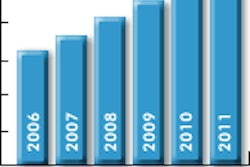Arlington, VA — March 8, 2006 — After a solid period of sustainable growth, U.S. manufacturing production declined in fourth quarter 2006 and will likely remain flat, or decline further, in the first quarter of 2007, according to the Manufacturers Alliance/MAPI Quarterly Industrial Outlook (ER-627e), a report that analyzes 27 major industries.
Overall, manufacturing will still grow in 2007, but at a reduced 2.5 percent rate compared to 4.7 percent in 2006, according to the alliance, which forecasts 3.1 percent growth in manufacturing in 2008.
"The EPA (Environmental Protection Agency) diesel emissions regulations and Microsoft's introduction of a new operating system and Office 2007 will distort purchasing in 2007, excessive inventories are now being drawn down, and major end markets for manufacturing (housing and motor vehicles) are declining in 2007," said Daniel J. Meckstroth, Ph.D., Manufacturers Alliance/MAPI chief economist and author of the analysis. "Fortunately, these issues will not be present next year."
Production Equipment Rising
In a sign that manufacturing is leveling off, fourth quarter 2006 figures show that 18 of the 27 industries tracked in the report had inflation-adjusted new orders or production above the level of one year ago, down from 22 industries that reported growth in the previous quarter.
Still, there was positive news from at least one key sector. According to the report, the fact that four of the seven production equipment categories experienced year-over-year double-digit growth in fourth quarter 2006 shows the durability of the manufacturing expansion. They include industrial machinery (20 percent); construction machinery (17 percent); mining and oil and gas field machinery (15 percent); and engine, turbine, and power equipment (11 percent). Other top industry performers in the fourth quarter were aerospace products and parts (17 percent); oil and gas well drilling (15 percent); communications equipment (14 percent); basic chemicals (10 percent); and electrical equipment (10 percent).
Consumer-oriented industries remain the weakest industrial sector, with housing activity plummeting by 24 percent in fourth quarter 2006.
Construction Machinery Seen Down
Meckstroth writes that nine industries are in the accelerating growth (recovery) phase of the business cycle; 10 are in the decelerating growth (expansion) phase; six industries appear to be in the accelerating decline (either early recession or mid-recession) phase; and two are in the decelerating decline (late recession or very mild recession) phase of the cycle.
The report also offers economic forecasts for 24 of the 27 industries for 2007 and 2008.
The MAPI forecast series predicts two industries to see double-digit growth in both 2007 and 2008. Aerospace products and parts should grow by 13 percent in 2007 and by 14 percent in 2008, while computer equipment should increase by 11 percent each year. The Alliance does not offer a forecast for semiconductor shipments, but the Semiconductor Industry Association envisions 10 percent growth in 2007 and 11 percent growth in 2008.
One industry in the equipment sector is forecast to have negative change both in 2007 and in 2008. Construction machinery is expected to decline by 2 percent and by 4 percent, respectively.
Overall, manufacturing will still grow in 2007, but at a reduced 2.5 percent rate compared to 4.7 percent in 2006, according to the alliance, which forecasts 3.1 percent growth in manufacturing in 2008.
"The EPA (Environmental Protection Agency) diesel emissions regulations and Microsoft's introduction of a new operating system and Office 2007 will distort purchasing in 2007, excessive inventories are now being drawn down, and major end markets for manufacturing (housing and motor vehicles) are declining in 2007," said Daniel J. Meckstroth, Ph.D., Manufacturers Alliance/MAPI chief economist and author of the analysis. "Fortunately, these issues will not be present next year."
Production Equipment Rising
In a sign that manufacturing is leveling off, fourth quarter 2006 figures show that 18 of the 27 industries tracked in the report had inflation-adjusted new orders or production above the level of one year ago, down from 22 industries that reported growth in the previous quarter.
Still, there was positive news from at least one key sector. According to the report, the fact that four of the seven production equipment categories experienced year-over-year double-digit growth in fourth quarter 2006 shows the durability of the manufacturing expansion. They include industrial machinery (20 percent); construction machinery (17 percent); mining and oil and gas field machinery (15 percent); and engine, turbine, and power equipment (11 percent). Other top industry performers in the fourth quarter were aerospace products and parts (17 percent); oil and gas well drilling (15 percent); communications equipment (14 percent); basic chemicals (10 percent); and electrical equipment (10 percent).
Consumer-oriented industries remain the weakest industrial sector, with housing activity plummeting by 24 percent in fourth quarter 2006.
Construction Machinery Seen Down
Meckstroth writes that nine industries are in the accelerating growth (recovery) phase of the business cycle; 10 are in the decelerating growth (expansion) phase; six industries appear to be in the accelerating decline (either early recession or mid-recession) phase; and two are in the decelerating decline (late recession or very mild recession) phase of the cycle.
The report also offers economic forecasts for 24 of the 27 industries for 2007 and 2008.
The MAPI forecast series predicts two industries to see double-digit growth in both 2007 and 2008. Aerospace products and parts should grow by 13 percent in 2007 and by 14 percent in 2008, while computer equipment should increase by 11 percent each year. The Alliance does not offer a forecast for semiconductor shipments, but the Semiconductor Industry Association envisions 10 percent growth in 2007 and 11 percent growth in 2008.
One industry in the equipment sector is forecast to have negative change both in 2007 and in 2008. Construction machinery is expected to decline by 2 percent and by 4 percent, respectively.









